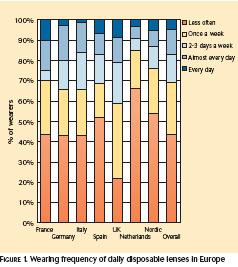The last year has seen a steady release of new daily disposable lenses from both existing and new manufacturers. A market that historically was dominated by two players now has more than nine companies offering lenses.
Two of the new daily disposables, Focus Dailies All Day Comfort and 1 Day Acuvue Moist, have included comfort agents to improve the performance of the lenses. These lenses have been shown to offer improved comfort to the daily disposable wearer. 
Independent market research conducted at the beginning of 2006 of current contact lens wearers across Europe shows that 51 per cent of daily disposable wearers rank comfort as the single most important attribute they would still like to see improved about their lenses. Overall, 71 per cent of wearers choose comfort as one of the top three attributes they would like to see improved.
Register now to continue reading
Thank you for visiting Optician Online. Register now to access up to 10 news and opinion articles a month.
Register
Already have an account? Sign in here
